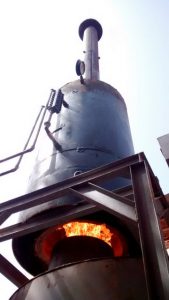
Ian Morris

Gasifier flame & boiler
Fullwell Mill is a UK-based food manufacturing SME that has been running for over 20 years and has strong social and environmental aims in terms of the way it carries out its business. We have invested significant resources – in time and cash – to develop and grow our key supplier SME partners in Africa & Asia over long periods of time, and have increasingly shared this expertise outside to help develop other supply-chains too, especially in the Organic, Fairtrade and ethical space. Businesses and organisations FM has helped and partnered with in this respect include TWIN, Kuapa Kokoo, Traidcraft, Dr Bronner’s, Zaytoun, Ndali, Liberation, Bayer, Institute of Food Research, Shell, BNP Paribas, Mercy Corps, DFID, GIZ, Sida, Danida, USAID, Comic Relief, Fairtrade Foundation and Shared Interest. We offer a range of expertise, including in an area we call ‘Energy & Appropriate Technologies’, which we have grown quite significantly over the last 5 years and are presently looking to further expand. We have now developed a number of improved, appropriate technologies which are demonstrating real business benefits to a number of SMEs in Africa, as well as having very clear environmental benefits.
i-genius met with Ian Morris, Overseas Project Manager, to find out more about Fullwell Mill.
i-genius: How did the idea for Fullwell Mill come about?
Ian Morris: The present day Fullwell Mill is actually a merger of two former companies, FM Foods Ltd and Tropical Wholefoods Ltd. FM Foods Ltd was, as Fullwell Mill still is, an SME manufacturing healthy snack bar products, whereas Tropical Wholefoods was a pioneering Fairtrade & Organic brand of dried fruit and nuts. The two businesses merged and Tropical Wholefoods became a wholly owned brand of Fullwell Mill.
i-genius: Are you a social enterprise?
Ian: Fullwell Mill does not regard itself as a social enterprise. We are a company limited by shares that has strong social and environmental aims in terms of how it carries out its business, and has increasingly used this expertise and motivation to help other food/agri businesses to do the same. Such businesses are often in the Fairtrade, ethical trade or Organic space, but we have helped some pretty conventional businesses too on occasions.
i-genius: What difficulties have you experienced setting up Fullwell Mill?
Ian: Being a manufacturing business there have been times where the high fixed costs associated with running a factory have created large cash flow issues. Equally there are instances in our business when cycle when, for purely commercial reasons, it would have been better to reduce staffing numbers but, being a Fairtrade company, we choose to take a longer view. Other than financial issues, the major problem we have, and continue to face, is the difficulties associated with importation form the developing world. Delays, infestation, adherence to spec etc
i-genius: What is typical working day for you?
Ian: Like most people I don’t really have a typical working day, though I can say, again like most people no doubt, that it is spent in front of a computer. I am in regular contact with our ‘Energy & Appropriate Technologies’ team based in Burkina Faso, West Africa, and I sure spend a lot of time sending and receiving e-mails, reviewing and producing documents, and talking to people by Skype, phone or in person. I travel a few times a year, mostly to Burkina Faso these days, but not too regularly thankfully, as I have small kids that make sure I’m busy at home too.
i-genius: What are ‘Energy & Appropriate Technologies’?
Ian: These can be bio gas or gasification/pyrolysis systems that use waste streams (typically from agri-processing SMEs in Africa) to generate energy, so far in the form of gas, though we would love to get into electricity generation too, though this is more complex. It can also be improved solar drying technologies, to enable, say, farmers to dry their product to preserve shelf-life and derive more value for their product, potentially via export. We are also working in partnership with a French NGO to try and help women’s groups in Burkina Faso (initially) to manufacture charcoal from agri-waste streams, rather than firewood, to help reduce deforestation, reduce the time spent by women and children collecting firewood, and also helping women earn an income, or more of an income of their own. We are also doing research to ascertain whether we might be able to develop simple, household or micro-community bio-gas units that can use cashew apples as input feed. Many people do not know what a cashew apple is, but I can tell you that they go to waste in humungous volumes in cashew producing regions of the world, and we are working on different R&D activities to try and help farmers get some value – whether by development of a food product, development of an energy generation system that can use them as feed, or both. Our focus for these technologies has been at the SME agri-processor level in developing contexts, to try and help these crucial business become more viable, as well as to improve the environment of course. But as you can see we are also trying to see what we can do at the farmer, household and perhaps even community level. These technologies have never been more important and pertinent.
i-genius: Where would you like Fullwell Mill to be in 5 years time?
Ian: I will have to narrow down my focus to the work on these technologies here, though I know my Directors would have plenty to say about where they would like the snack-bar manufacturing side of the business to go too! Given the fact, and it is a fact, that there is so much need, and in effect, latent demand, for these kind of technologies, I would want to see us playing whatever role we can and is appropriate in the future to not just replicate, but really scale the adoption of these and other appropriate technologies as widely as possible and appropriate. Those who know us, know we are an extremely open, flexible and pragmatic business, and so we are open to any new ways of working that can achieve this. We are not protective about IP because we want these solutions to spread far and wide to do good, and are only interested in covering our costs in this area of work. Or, if we do manage to make some profit then we will likely plough this into more R&D in the area. We are small, though punch about our weight I think, and so we are always looking for useful new partnerships, as it is such a sensible and efficient way of developing and growing. We are quite literally always on the look-out for new people to partner with, so if anyone reads this and wants to get in touch please write to me at: ian@fullwellmill.co.uk
i-genius: What are the most crucial things you have done to grow and develop Fullwell Mill?
Ian: Building relationships, building partnerships, building our systems (but again in an appropriate way, as we’re a pretty small outfit), building our team, and building awareness about what we have done, can do and want to do. I think we still have quite a lot of latent reputation and respect in different circles, and have not shouted about the great work we have done in the past, but need to change this if we are to really ramp-up our impact. Few people benefit from being modest and quiet, sadly. But we are a small team, and so have to communicate as strategically as we can, such as through this interview, for example!
i-genius: How you have ensured that Fullwell Mill has become a sustainable business?
Ian: Fullwell Mill has decided to comply with a number of standards (e.g. Fairtrade, Organic, SEDEX etc), which ensure it reaches at least a required standard across these different schemes. However, Fullwell Mill goes above and beyond these, as it believes more can and should be done, and our work in helping not only our own supply chains, but others’, is testament to this.
i-genius: Tell us more about your fairtrade and organic brand ‘Tropical Wholefoods’:
Ian: Fullwell Mill Director Adam Brett and his wife started Tropical Wholefoods in Uganda in the early 1990s. They were both working in Uganda at the time and wanted to help Ugandan farmers sell their fruits at good prices in European markets. Solar fruit drying seemed the answer. It’s an affordable technology, uses only renewable energy (the sun), adds value, extends shelf life, and makes fruits more transportable, retaining waste at the point where it is grown. Fruits are sun dried when fresh and fully ripe so capturing flavour – and with our solar drying systems, no preservatives or sugars are added. We set up a network of farmer suppliers with Fruits of the Nile and soon we were importing our first sun dried bananas and pineapples from farmers. Our second supplier partner was Gebana Afrique in Burkina Faso who supplies us with dried mangoes and cashews. Apricots, almonds and walnuts were to come next from Mountain Fruits in Pakistan. For Tropical Wholefoods, Fairtrade means more than just buying fruits at Fairtrade prices. We also give technical advice to all our suppliers. This can be us helping with factory management and design, advising on organic and Fairtrade certification, or on best agricultural practice. Staff from Africa or Asia can also benefit from coming to our factory in Sunderland for in-house training. We also help our partners get development funding to grow and improve their businesses.
i-genius: What advice would you give to those starting up a social business/project?
Ian: The world is full of advice, ranging from terrible to incredible. Don’t get me wrong, advice is obviously incredibly important, and when you’re starting-up, you likely need lots of it. But most of us can only give advice based on our own somewhat limited experiences, and so it is important to speak to enough of the right people (and the word right is so important) to get different viewpoints, pick-out common themes, and more importantly pick-out what makes sense to you, for you are the one that knows what you want to achieve and who will be bearing the responsibility and risks surrounding your start-up. Have open ears and an open mind always, but remember that you are in charge, and that you get to decide what to do and not to do. Be confident about what you know, though don’t let this slip into arrogance. Where you have gaps, seek to fill these in appropriate ways. Rome was not built in a day, and there are plenty of examples of successes which were initially trampled on, even jeered at, so you may need to be quite determined and thick-skinned at times.
Main website: www.fullwellmill.com
Fullwell Mill’s Faritrade & Organic brand: www.tropicalwholefoods.com
This interview was conducted as part of the i-genius ‘Innovation, Business Start-Up and Wellbeing’ interview series. If you would like to develop a particular aspect of your business or address something you are struggling with, then why not take our ‘Social Entrepreneur and Business mentoring’ sessions with i-genius Academy. To find out more, click here!

